The Festival Cruïlla mission is to create a meeting place for Barcelona’s cultural and social diversity and to make sustainability and care for the environment part of its DNA. We believe that large events should tend towards a model of medium-sized festivals, aimed at local audiences, committed to the territory, citizens and their environment, and we want Cruïlla to be a pioneer of this.
A Circular Festival
We are working on different aspects to reduce our impact, which is improving year after year. Our strategy now focuses on reducing waste generation, with the aim of being a circular festival.
Reusable glasses and tableware
At the last edition of Cruïlla, a system of reusable glasses was chosen. In order to be able to reuse them at other public events or festivals, a generic glass is used, without the Cruïlla logo, to facilitate their use at other festivals or events.
This circularity model, validated by the Agència de Residus de Catalunya, allows us to move forward in the waste hierarchy, as it is more efficient to wash and reuse a polypropylene cup than to recycle it mechanically. A cup can be washed up to 200 times, but when it is sent for mechanical recycling, the resulting plastic cannot be remanufactured into another cup.
Given that the public must pay a deposit when purchasing the cup, and with the aim of facilitating their return so that they can be reused, we set up 3 stationary and 10 mobile packaging return points where attendees can return the containers they have purchased and recover the amount paid.
Also this year we will reduce conventional single-use packaging for reusable packaging (plates, bowls, trays, boxes…), both for the public and for workers and artists. In the gastronomic area, therefore, all those operators who can due to logistics will use these containers and, following the same system as the glasses, the crockery will be returnable at the return points and will be washed so that they can be reused at other festivals, delivery services or public and private canteens. In this way, more than 35,000 single-use containers are saved. All cutlery will be made of certified compostable material.
Linked to the packaging return system, we have a Green team, a mobile team of 25 people who will facilitate this operation at any point of the venue thanks to Endesa.
Sustainable Festival Challenge
The Sustainable Festival Challenge, promoted by Cruïlla and the Barcelona Music Lab and Damm Foundation, is an open call for StartUps working on environmental solutions to reduce the impact of festivals. This year it focused on finding solutions that reduce the generation of waste and projects that promote the circularity of materials. The winner of the Challenge was Vytal, a tableware rental company, with a proposal to convert the gastronomic area from disposable to reusable packaging.
We will also develop a pilot with AbonoKm0 as controllers/implementers of the integrated waste management of the festival.
Waste management
To promote the path towards a circular festival, we generate a waste management protocol that covers all phases of the festival: set-up, activity and dismantling. We implement a series of measures to facilitate this:
- Installation of a ‘Green Point’ in the assembly and disassembly phases, to improve the selective collection of all those elements that cannot be reused.
- Waste management team, through our partner AbonoKm0, who will carry out daily monitoring work, both in pre-production, assembly, during the activity and dismantling.
- Generation of a form for each of the suppliers so that they can send us an estimate of each fraction of waste generated.
- Guide of good practices to promote design with reusable, local and quality construction materials, and the prioritisation of digital communication instead of physical signage, among others.
- Appeal to different local entities during a dismantling day for donations of production materials that are treated as waste, such as: wooden pallets, black raffia, tarpaulins, signage materials… In this way, these different materials can be given a second use.
- Art is trash: through the Poblenou Urban District‘s proposal of the same name, we programme the live creation of artistic pieces made with waste material generated by our activity.
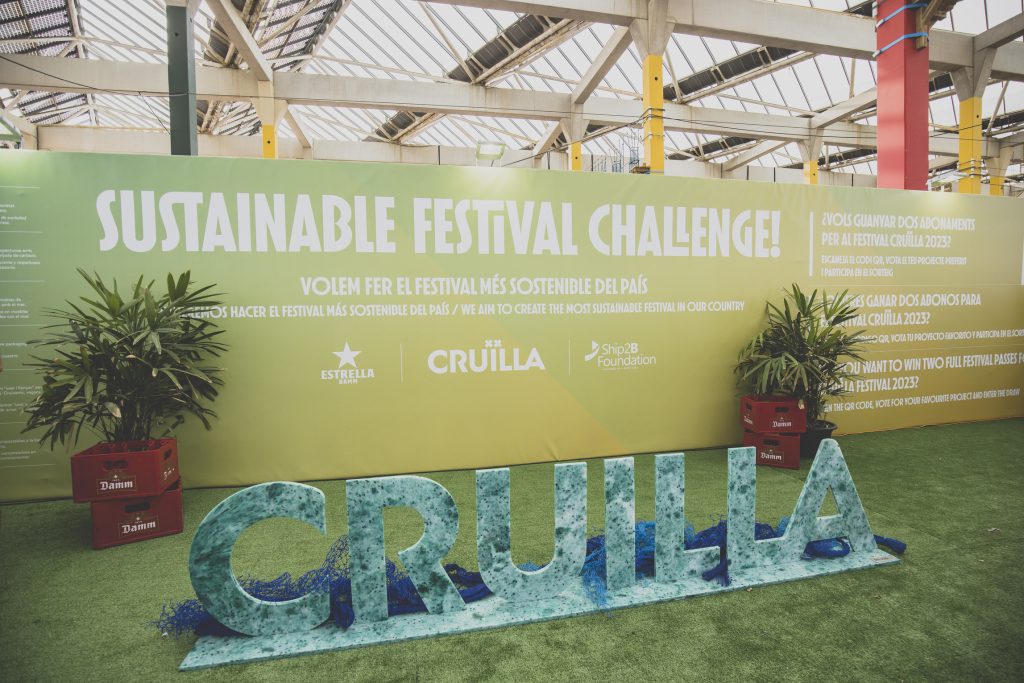
A LOCAL FESTIVAL
Local suppliers
We work with local suppliers to generate positive environmental and socio-economic impacts. At the same time, they help us to develop the objectives of circularity and commitment to the territory, citizens and the environment.
Noise Impact
We carry out an acoustic impact study that includes measures such as:
- We direct the stages taking into account this study in order to minimise the impact on neighbours.
- We incorporate sound level limiters to the sound systems.
- We carry out sound level measurements at different points in the neighbourhood during the festival to control this impact.
Also, with the aim of protecting attendees from noise pollution and preserving their hearing health, especially for children, together with Endesa we offer protective helmets for everyone who needs them. Finally, we’ll create for the first time a Silent Disco, integrated into a light installation, with a sound system that uses wireless headphones will allow us to reduce the noise impact in the neighborhood.
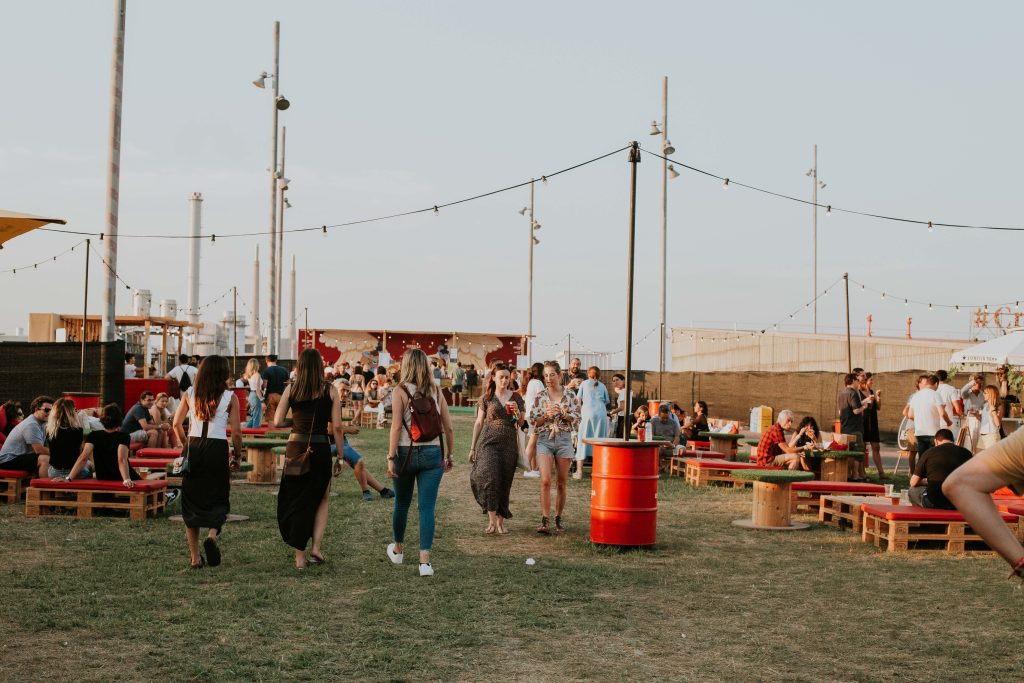
GREEN ENERGY WITH ENDESA
Green energy
The Festival Cruïlla, thanks to Endesa, exclusively uses electricity from renewable sources from the Fòrum venue’s network, eliminating the use of diesel generators. In the 2023 edition, Cruïlla saved around 10,000 litres of diesel, which produce 36,000 kg of CO₂.
Carbon footprint study
At the Festival Cruïlla 2023, a study was carried out to calculate the carbon footprint with Eurecat, to take it into account in order to take measures for this year’s edition. Finally, consumption was 465 tonnes of CO₂e, equivalent to 6.52 kgCO₂e/attendee. This study includes direct and indirect emissions, associated with the festival’s value chain, imported energy, transport of artists, people and goods outside the organisation’s boundaries… According to A Greener Future, a non-profit organisation, which analysed 17 British and European festivals in 2022 and 2023, it concluded that the average figure for emissions per person per day stands at 11 kg CO₂. Therefore, we have achieved that consumption at the Festival Cruïlla is lower than the European average, but we want to continue improving.
Green Rider
As part of the relationship with the participating artists, they receive the festival’s Green Rider, which lists the set of good practices in the field of circularity and care for the environment, of which we mention the following:
- All containers provided to the artists are reusable and returnable. The use of plastic water bottles is prohibited, only the use of canteens provided by the festival is allowed, which can be refilled at the mineral water stations that will be located in all backstage areas.
- Cruïlla will offer ground coffee beans to all backstage and production offices, in order to eliminate the use of coffee capsules, which generate a very high volume of waste.
- The hospitality rider will be reviewed before purchasing, in case there are any modifications. The nature of touring may mean that items in the rider may have changed or may no longer be necessary. Cruïlla Festival will check with the tour manager prior to final purchase to ensure that requirements remain the same and to avoid unnecessary waste. Cruïlla Festival only provides quality, local food and healthy options.
- To minimise the use of materials from polluting industries, artists are asked to bring their own towels and to avoid any unnecessary printing and, if essential, to use only ethically sourced certified paper or, preferably, recycled paper.
- The Cruïlla Festival books accommodation for the artists, as close as possible, to minimise transport to and from the show. These hotels have ecostar environmental certification.
- Artists are asked to make responsible use of the transfer service.
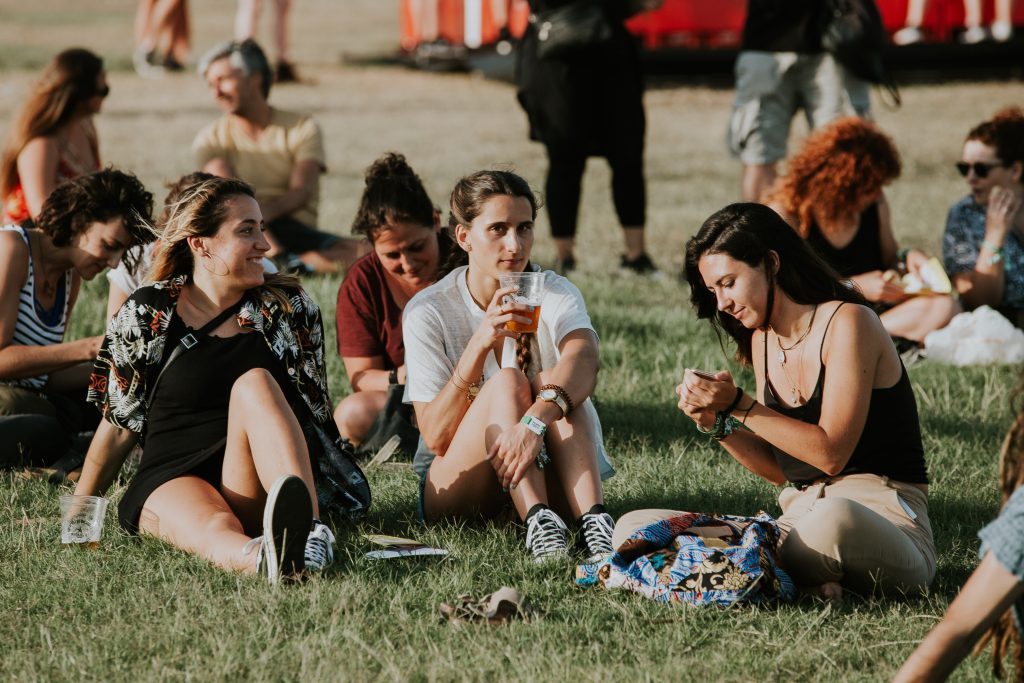
Communication
We believe that festivals are not only unique events, but also platforms to promote social awareness. Through our actions, we seek to promote behavioural changes that transcend the spectacle and benefit society in general. We have a set in the middle of the venue where the festival’s sustainability initiatives are exhibited. With the collaboration of Endesa and through interactive games, like a robot that calculates your carbon footprint, we explain the different initiatives that are carried out to reduce the environmental impact in order to raise public awareness. The communication aimed at the public seeks to inspire, educate and empower our audience, promoting environmental values and a critical spirit.
Training
To promote environmental training and a critical spirit in the field of sustainability in our company, we have organised an environmental talk at the Cruïlla office with the renowned Valencian environmentalist, Andreu Escrivà, so that the team is the first to be aware of working with these objectives and values.
Merchandising
The textile industry is one of the biggest polluters and is responsible for approximately 20% of water pollution worldwide and 10% of global CO2 emissions. For this reason, part of Cruïlla’s merchandising is produced on demand, with printing on site at the festival. Thanks to this, no surplus garments are generated. With this production system, it also allows us to offer the public to take clothes from home and print them with the design of their choice to reuse instead of generating new garments. We will also produce a limited series of T-shirts and socks with IAIOS, a locally manufactured supplier, using recycled yarn and circular design values aligned with those of the festival.
Stands and ephemeral constructions
We are launching a circularity protocol for the construction of stands and unique spaces linked to the different sponsorships. We are working with the Circular Making consultancy firm to generate an infographic/fiche to share with the assemblers of these constructions so that they can comply with our circularity criteria. This sheet is a compilation of recommendations on the use of recycled, local and good quality materials. We will also promote the use of reusable construction materials and the prioritisation of digital communication instead of signage, among others, and we will also offer the possibility of generating a post-festival report/audit that collects data from the assembly and a guide to good practice in circular stand design.
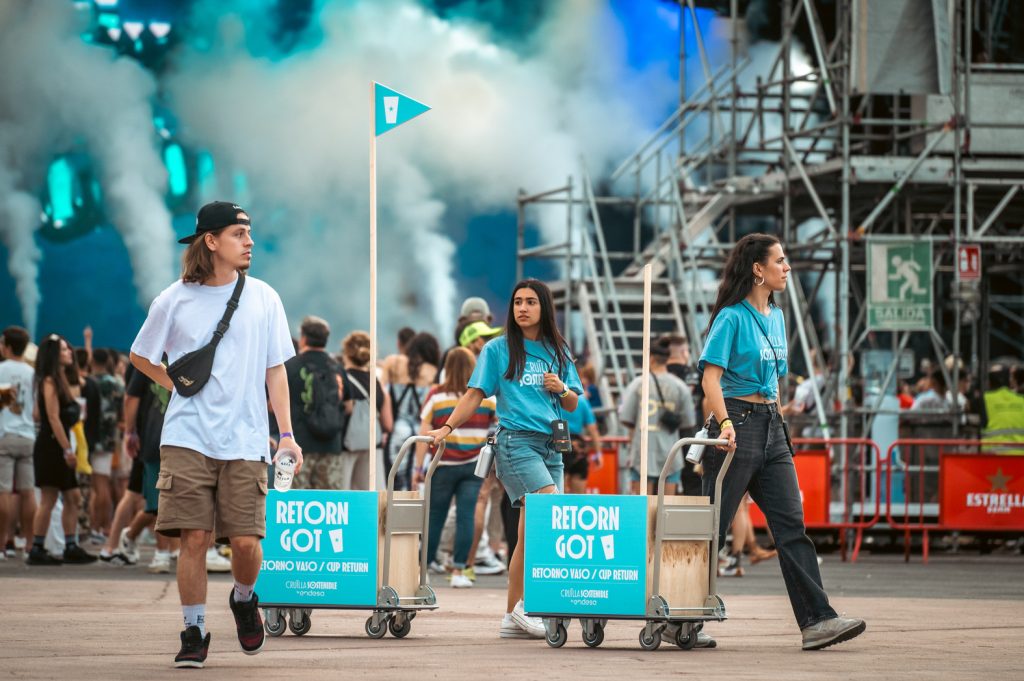
Water Management
Water is a scarce commodity, which is why Cruïlla is launching a series of actions to raise awareness and work on this problem.
Together with Aigües de Barcelona, we are launching a study of the water impact of our festival, which will be continued in future editions in order to promote a better water culture in the field of events. This study will include an analysis and calculation of the festival’s water footprint, the traceability of the water circuit, direct and indirect consumption and a guide to good practices in water management.
On the other hand, production teams, staff and artists are provided with recycled aluminium water bottles, thanks to Endesa, and all work and backstage areas are equipped with water dispensers. The public is also offered free water fountains throughout the venue.
Finally, Oxfam Intermón will carry out a communication campaign within the festival to raise public awareness of the water shortage we are facing, here and on a global scale, aggravated by the climate crisis, as it is an issue that concerns us.
Environmental Certifications
We signed an agreement with B Greenly to certify the Festival Cruïlla 2024 as a sustainable event, to validate all the actions we take to reduce our impact. B Greenly ORG S.L. is a certifier and consultant specialised in the certification of sustainable events and carries out processes to accompany companies in their transition towards sustainability. B GREENLY will analyse and measure the metrics and percentages to check if the results are sufficient to obtain the Sustainability Certificate and will also collaborate in the elaboration of a guide of good sustainable practices.
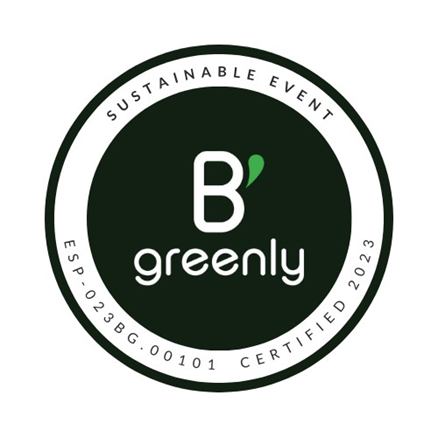
Sustainability is not a fad, it is the only way. And, in our case, it is a firm commitment.
We believe that large events should tend towards the Cruïlla model. A model of medium-sized festivals, aimed at local audiences, committed to the territory, citizens and the environment.